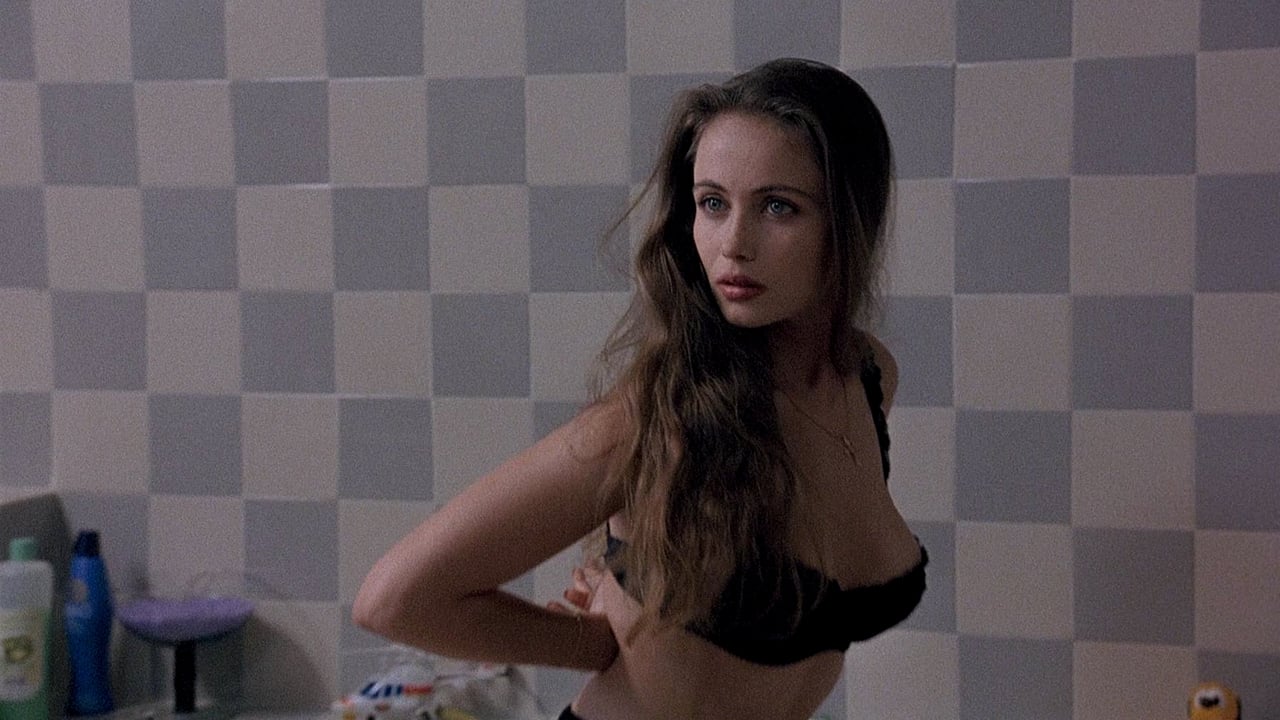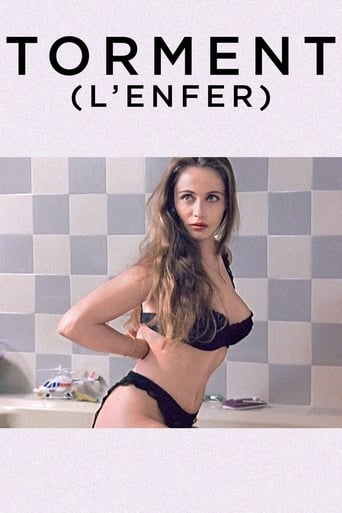

Instead, you get a movie that's enjoyable enough, but leaves you feeling like it could have been much, much more.
... View MoreAll of these films share one commonality, that being a kind of emotional center that humanizes a cast of monsters.
... View MoreThe movie turns out to be a little better than the average. Starting from a romantic formula often seen in the cinema, it ends in the most predictable (and somewhat bland) way.
... View MoreThis is one of the best movies I’ve seen in a very long time. You have to go and see this on the big screen.
... View MorePaul, an irritable and stressed-out hotel manager, begins to gradually develop paranoid delusions about his wife's infidelity. As he succumbs to green-eyed jealousy, his life starts to crumble. Each step on his downward spiral to madness seems to accelerate, driving him further along the path to a personal heck.The story was adapted by Chabrol from the screenplay by Henri-Georges Clouzot for the unfinished film "L'Enfer", which Clouzot began shooting in 1964 but was unable to complete. One has to wonder how it would have been different in the 1960s, but other than the film quality, it would probably be very similar... the plot is timeless.Both leads do an excellent job of being desirable and obsessive, respectively. Certainly an interesting film, and even though the concept is simple, it comes across as very effective and may be Chabrol's finest work.
... View MoreSurprisingly good, in fact rather splendid late Chabrol. We start with a young couple full of love and optimism as they bounce about running their hotel, bringing up baby and making eyes at each other. The wife seems to naturally do this semi flirting semi friendly stuff with everyone and gradually her husband begins to become jealous. We are never 100% certain but what at first seems six of one and half a dozen of the other descends into the 'hell' of the title as the green eyed monster truly comes to fruition. Initially delightful, this movie gets as dark as it possibly could and we are gripped, even perhaps more than with a Hitchcock as the terrible finale awaits.
... View MoreAs one of the originators of the New Wave, Claude Chabrol deserves a large amount of respect. His films such as Bon Femmes and Le Ceremonie put him in the high ranks of the best film makers, but in this case, L'Enfer, he does not match up to his own high standards. This could also just be my opinion since I didn't enjoy watching the downward spiral the characters go through.It was a ride I would rather not taken. Be that as it may, the film lacked a fullness of motivation for its lead, whose insanity seems to come from nowhere. Maybe again it is due to his mental illness, but as a viewer of the scene I needs to to know why. As France's Hitchcock, Chabrol needs to let us put the pieces together, as he let us do in his film The Unfaithful Wife, as we see the literal pieces of a puzzle reflecting the clues to the crime. If you love Emmanuel B'eart as we all do, you will find her and her fellow actors in good form, but the story falls flat.
... View MoreAlthough Emmanuelle Béart (Manon des sources (1986), Un coeur en hiver (1992), etc.) is particularly beautiful in this Claude Chabrol film and entirely compelling in the role of a free-spirited wife suspected of adultery, and even though her co-star Francois Cluzet (Une affaire de femmes (1988)) does a fine job as a man obsessed with jealousy, this turns out to be an almost boring movie.I think the problem is in the ambiguity about Nelly's infidelity that director and scriptwriter Chabrol relied on. Ambiguity by itself does not create tension. Artistic tension comes from an interplay within the mind of the viewer between an anticipated or expected result and its actual delineation. Thus in comedy we know that they will live happily ever after, and in tragedy, the fatal flaw will lead to something horrible. We can even know the end of the story, as in Shakespeare's Romeo and Juliet or in the Swedish film, Elvira Madigan (1967), or indeed in any number of war films, and still eagerly anticipate how it happens. In fact, I think it is always the case that we anticipate the end of a story at least in a general way: good will triumph over evil, the evil person will get his or her comeuppance, the British army will win the war, etc. In modern cinema this may not seem always true since the bad guys sometimes triumph, as in noire movies. Nonetheless I think the ending of such movies is really what we expect, the revelation of the essential unfairness of the world. It becomes then only a question of just how this unfairness manifests itself. As in classic drama, the modern comédie noire may be seen as a tragedy, with society or the meek or the slow or the trusting being devoured by the wild animals of the city.Regardless, here I think it might have been better to clearly reveal Nelly's infidelity or lack of it, early on, and then focus on its discovery or the revelation of a delusion. Obsessive jealousy is a theme that should work, but may be harder to put on film than Chabrol realized. I think too that the character of the irrationally jealous man be made manifest in some collateral way; perhaps we should see his insecurity before hand somehow; perhaps he should have some obvious shortcoming of appearance or character or there should be something from his past that leads him to irrational jealousy. Clearly an older man with a young and beautiful wife may be jealous in anticipation of the inevitable; or any man with a flirtatious wife. This is not necessarily irrational. Béart's Nelly reminds me of Brigitte Bardot from the days of her youth as in And God Created Woman (1957), a naturally warm and sensuous being, full of affection for others, very beautiful and impossibly sexy. The way Nelly walks and swings herself owes something to Bardot. The psychology of the Roger Vadim film from the fifties advanced the controversial) argument that a woman like that needs a firm hand. Here the suggestion is that the husband's jealousy can only lead to pain and disaster, and that the only hope is complete trust.What I am trying to say is that the psychology, like the tension of the film, seemed at loose ends. It is clear before we are halfway through that Nelly really loves her husband, the real question being, is he enough for her? I also think that Nelly's character should have included something negative in it (she seems a little too good to be true), something the viewer could relate to, perhaps a past infidelity or betrayal.Charbol is a better director than this film might indicate. See the aforementioned Une affaire de femmes (1988) starring Isabelle Huppert as an example of what he can do.(Note: Over 500 of my movie reviews are now available in my book "Cut to the Chaise Lounge or I Can't Believe I Swallowed the Remote!" Get it at Amazon!)
... View More